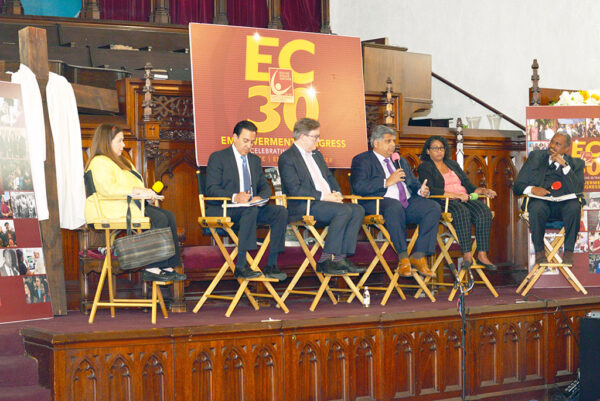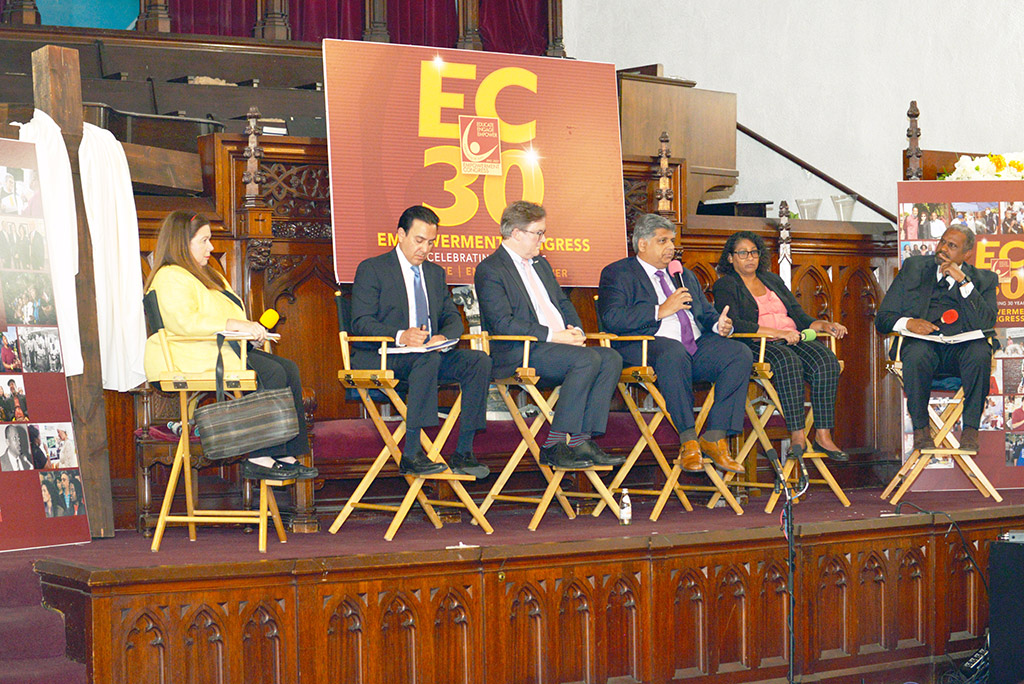Published on OurWeekly.com on Wednesday, May 18, 2022.
On May 12, nearly 100 people attended the Empowerment Congresses candidate forum with five of the candidates vying to be the next Los Angeles city attorney. “Empowered to Represent: A Forum Among Los Angeles City Attorney Candidates” was held at McCarty Memorial Church and moderated by KBLA Talk Radio commentator and author Tavis Smiley.
The forum offered candidates an opportunity to introduce themselves, to share their varied backgrounds and qualifications and to discuss their priorities and positions on a variety of issues.
“Almost all Angelinos agree that homelessness is one of, if not, the most pressing crisis impacting our city,” noted Smiley.
“One of the first things I would do is advise the mayor of the city council to declare a state of emergency. We have to overcome the dysfunction between the county and the city,” Teddy Kapur stated.
Kevin James wants a regional solution to the problem and would use the city attorney’s power to settle high profile lawsuits to bring other municipalities into the effort.
“The city attorney’s office is the only office in the City of Los Angeles that can require a regional solution to homelessness,” James said. “How do we do that? By not settling the cases that are brought against the city of Los Angeles…And when you settle one of these lawsuits, you’re letting Beverly Hills and Culver City and Redondo Beach and Burbank off the hook. Why are you letting them off the hook?”
Faisal Gill disagreed, “You can’t just say I’m not going to settle lawsuits…. You have to look at the facts in the case.”
Gill said he would emphasize three approaches, “to provide advice to the city council and the mayor on what to do on homelessness, defend lawsuits that are filed against the city dealing with homelessness” and use the office’s discretion to determine whether to “charge folks who are out there sleeping on the sidewalk.”
Continuing a robust, but civil exchange of views, Sherri Onica Valle Cole challenged Gill’s perspective.
 Speaking from the perspective of “being unsheltered as a kid with my family,” she would “actually enforce the laws on the books to protect tenants and homeowners.”
Speaking from the perspective of “being unsheltered as a kid with my family,” she would “actually enforce the laws on the books to protect tenants and homeowners.”
Valle Cole agreed, “We need to keep homeowners in their homes,” and would use the power of the City Attorney’s office to defend homeowners and tenants from eviction.
Hyde Feldstein Soto would use the power of the office as signatory to contracts for city-financed production of affordable housing and delivery of mental health services to negotiate better service delivery at lower cost to taxpayers.
“I would put a stop to the award of contracts on a no-bid basis without really calling to task the department that’s issuing it,” she said. “Secondly, the form of indenture that we’re using is outdated. It’s 20 percent of costs and leaves developers scrambling for the 80 percent that’s not available in the market. Third, we’re operating under a services agreement for mental and public health with the county that dates back to 1964.”
There was an equally vigorous exchange of views on the all important topic of public safety and police accountability.
“The first thing I would do is conduct a disparate impact report, a retroactive racial analysis on the enforcement of our various penal codes,” Feldstein Soto declared, noting tht enforcement of situations like “drinking out of an open container need to be treated the same way. And so we need the information to make sure that we are enforcing equally.”
“So we can have public safety and police accountability at the same time,” observed Gill. “In fact, we need to have both. I’m all in favor of having a robust police force, but that police force has to be accountable. We need different types of thinking in order to address crime.”
“However, training, de-escalation, equipment and data and data improvement that holds everyone accountable, including our LAPD officers, all of that costs money,” opined James. “We do need additional funds in the city attorney’s office to be a partner of the L.A., to manage the office, to prosecute the misdemeanors that need to come to our office. But also of equal, if not more importance, is to run our diversion programs, the diversion programs that can set people on the right path that have come in through our justice system, also cost money.”
Kapur called for enforcement of laws against ghost guns, more use of “red flag” laws “that allow us to get guns away” from a “person that isn’t suitable to have his gun at that time and there could be a restraining order put in place.”
Regarding police accountability, Kapur said, “Governor Newsom signed a host of criminal justice reform laws. I supported those and one in particular, is Senate Bill 2. That allows for the decertification of bad officers. We need to train the police as professionals. We can decertify attorneys, teachers, doctors. The same should be for public safety officers.”


